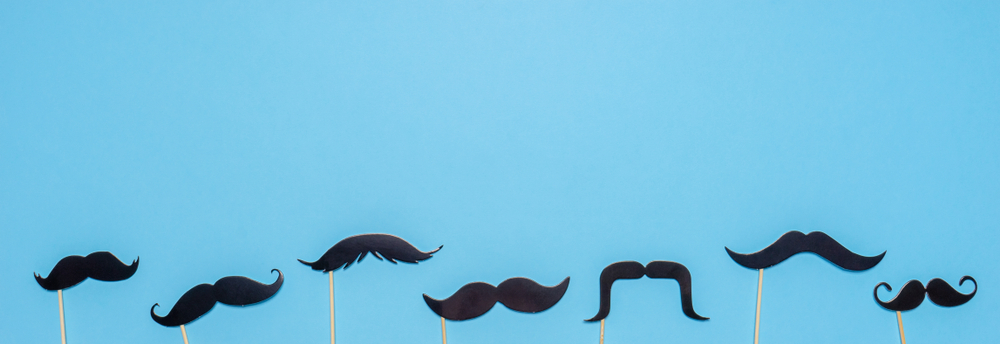An overview of some of the easy steps men can take to improve their physical and mental health and reduce stress in their lives.
Throughout Movember (moustache and November combined), TGIUK’s social media team has promoted this growing global movement raising awareness of men’s health – physical and mental. As we end this campaign, we look at some easy steps men can take to support their well-being.
It may seem strange that when women are still fighting for gender equality that we need also to support men in caring for their health. There have been many studies into why young and older men tend to be reactive rather than proactive regarding health issues. Even in these times, there is a tendency for some men to downplay their symptoms as they fear that other people will consider them weak. The rise of GP consultations online or over the phone during the pandemic enabled more men to reach out to GPs on medical concerns as there was more anonymity and confidentiality while avoiding waiting rooms and face-to-face consultations.
A good start for men in their forties and above is to take up the free NHS Health Check, a midlife MOT that can identify any early signs of heart disease, diabetes, kidney disease, stroke, and other health problems. It usually takes about 20 minutes, with a health professional conducting simple tests such as blood pressure, weight, etc., and gives you personalised advice to reduce any risk. Health experts recommended that from around the age 40, men (and women) should have a check every five years. Your GP surgery will typically call you automatically to make an appointment but if not, don’t wait, book the test yourself in your surgery or at participating pharmacies, mobile units or via your local authority. It is essential to seek help for medical problems when you need it – it is not a sign of weakness; it is being proactive in taking control of your health and looking after yourself and possibly your family. The quicker any medical problem is identified, the faster the treatment and the quicker the cure.
When it comes to mental health issues, there is evidence that suggests that the traditional masculinity norms stigmatize seeking help, which is a real cause for concern. Data indicates that 70% of people who take their own lives are men and that males between the age of 45-64 have the highest suicide rate, though suicide statistics amongst younger men have declined. Tragically, over recent years, there has been an increase in suicide and self-harm amongst young unaccompanied male asylum seekers. Many have fled persecution in their own countries, often making a difficult and dangerous journey to the UK, having had to leave their families behind. It is hardly surprising that they can suffer from Post-Traumatic Stress (PTSD) or depression.
There are many ways to address mental health concerns, with the primary guidance to seek professional help. Still, there are also ways to self-help and find ways to relieve or reduce stress levels, working alongside the advice given by your GP or medical practitioner. There are many support groups and organisations; we have listed some contact details below. In addition, TGIUK found some groups that provide mental health support in different ways.
Da’aro Youth Project is a community-led organisation supporting young refugees from the Horn of Africa. They were established in 2018 in response to the tragic suicide of several teenage Eritreans. Sadly, the journey undertaken by many young refugees from Eritrea, Ethiopia and Sudan is traumatic as they travel through the Sahara Desert and the Mediterranean Sea and cross multiple borders across Europe. The stress of waiting for decisions on their status, fear of being deported back to the place they fled from and often dealing with Post-Traumatic Stress have led some to resort to self-harming, drugs, alcohol or ultimately ending their own lives. In TGIUK’s anthology, “Hear Our Stories”, due for publication in 2023, we share poignant stories of refugees who made this journey, with one young man writing, “I have never witnessed or experienced cruelty like this, I did not feel human”. It is no wonder that many struggle to adapt to a new life in a strange country without their families to provide emotional support. Based in London, Da’aro Youth Project run a weekly youth club and provides casework support for these young refugees. Their youth club, Injera Club, provides a relaxed social environment where young people can be young, play games, meet their peers, and enjoy some traditional cuisine. At the same time, they learn how to advocate for themselves and how to make changes in their lives. The Casework Support is for any young people in this community who are in crisis or are dealing with a significant problem. Through this organisation, young migrants have access to advice, advocacy, emotional support and referrals to legal advice and organisations.
Men’s Shed is a community movement which has become a recognised powerful tool in addressing health and well-being in men. The underlying concept of the Men’s Shed is to provide a place for men to come together to socialise and support each other. Each Men’s Shed can offer different activities, from drinking tea and chatting to workshops with furniture repair or men playing pool or cards. You might see younger men working with older men learning DIY skills or men of all ages learning to cook or become computer literate. You will always find a warm welcome and an open invitation, whatever your age, nationality, status, or religion. The sheds provide direct and indirect opportunities for improved health and well-being for men, from providing health information to combating the effects of social isolation or stress. The UK Men’s Sheds Directory provides details on the various Men’s Sheds Association in England, Scotland, Wales, and Northern Ireland. You can easily find one near you or liaise with them to set up your own community Men’s Shed. Meeting groups such as these will help men who have recently come to the UK for whatever reason to meet new people, make friends, increase their confidence living in a new country, and, if necessary, help with their English language skills.
Given some men’s anxiety about physically visiting a health practitioner, several online male support platforms offer a sense of community and well-being for mental health support. One such online group, Men’s Group, is an online community platform that provides moral support and open discussion forums on any life issues and provides career, financial, and social guidance. Their mission is to help you find your better self, feel comfortable and happy with yourself, or know how to make necessary changes.
There are many ways that men, young and old, can take control of their physical and mental health; it just takes the first step. Encourage brothers, fathers, husbands, and male friends to look after themselves by taking the first step yourself – great leaders lead by example. Supporting Movember by wearing your moustache is a great start, and then next year, support the movement by being in control of every aspect of your well-being.
Helplines
For physical health support, contact your local GP or visit the NHS site, Men’s Health – Common Health Questions
For mental health support and if you need to talk immediately, contact any of the following helplines. Their trained people are ready to listen and won’t judge you.
- Samaritans 116 123
- To talk about anything that is upsetting you, you can contact Samaritans 24 hours a day, 365 days a year. You can call 116 123 (free from any phone),
- SANEline 0300 304 7000
- SANEline is a national out-of-hours mental health helpline offering specialist emotional support, guidance and information to anyone affected by mental illness, including family, friends and carers. They are normally open every day of the year from 4pm to 10pm on 0300 304 7000.
- National Suicide Prevention Helpline UK 0800 689 5652 (open 24/7).
- Offers a supportive listening service to anyone with thoughts of suicide.
- Campaign Against Living Miserably (CALM) 0800 58 58 58
- You can call CALM (5pm–midnight every day) if you are struggling and need to talk. Or, if you prefer not to speak on the phone, you could try the CALM webchat service.
- Shout 85258
- If you prefer not to talk but want mental health support, you could text SHOUT to 85258. Shout offers a confidential 24/7 text service providing support if you are in crisis and need immediate help.
- The Mix 0808 808 4994
- If you are under 25, you can call The Mix on 0808 808 4994 (3pm–midnight every day) or use their crisis text messenger service.
- Papyrus HOPELINEUK 0800 068 4141
- If you’re under 35 and struggling with suicidal feelings or concerned about a young person who might be struggling, you can call Papyrus HOPELINEUK on 0800 068 4141 (weekdays 10am-10pm, weekends 2pm -10pm and Bank Holidays 2pm–10pm), or text 07786 209 697.
- Nightline.
- If you are a student, you can look on the Nightline website to see if your university or college offers a night-time listening service. Nightline phone operators are all students too.
- Switchboard 0300 330 0630
- If you identify as gay, lesbian, bisexual or transgender, you can call Switchboard on 0300 330 0630 (10am–10pm every day), or text their crisis text line.







